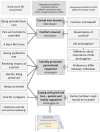A palliative care goals model for people with dementia and their family: Consensus achieved in an international Delphi study
- PMID: 38634232
- PMCID: PMC11025301
- DOI: 10.1177/02692163241234579
A palliative care goals model for people with dementia and their family: Consensus achieved in an international Delphi study
Abstract
Background: Advance care planning in dementia includes supporting the person and their family to consider important goals of care. International research reports the importance of psycho-social-spiritual aspects towards end of life.
Aim: To develop a multidimensional international palliative care goals model in dementia for use in practice.
Design: International Delphi study integrating consensus and evidence from a meta-qualitative study. The Delphi panel rated statements about the model on a 5-point agreement scale. The criteria for consensus were pre-specified.
Setting/participants: Seventeen researchers from eight countries developed an initial model, and 169 candidate panellists were invited to the international online Delphi study.
Results: Panellists (107; response 63.3%) resided in 33 countries. The model comprised four main care goals: (1) Comfort ensured; (2) Control over function maintained; (3) Identity protected and personhood respected and (4) Coping with grief and loss-person and caregiver supported. The model reflects how needs and care goals change over time with the progression of dementia, concluding with bereavement support. The first version of the model achieved a consensus after which it was slightly refined based on feedback. We did not achieve a consensus on adding a goal of life prolongation, and on use of the model by people with dementia and family themselves.
Conclusion: A new palliative care goals model for people with dementia and their families includes relationship aspects for use by professionals and achieved a consensus among a panel with diverse cultural background. The position of life prolongation in relation to palliative care goals needs further research.
Keywords: Delphi technique; Dementia; advance care planning; biopsychosocial; cognitive disorders; interprofessional education; model; palliative care.
Conflict of interest statement
Declaration of conflicting interestsThe author(s) declared the following potential conflicts of interest with respect to the research, authorship, and/or publication of this article: This study was performed with the same expert panel as with EAPC’s ACP Delphi study, but this study was not designed by the EAPC ACP in dementia task force. This separate study was not conducted as part of the remit of the EAPC task force. There are no conflicts of interest.
Figures


Similar articles
-
White paper defining optimal palliative care in older people with dementia: a Delphi study and recommendations from the European Association for Palliative Care.Palliat Med. 2014 Mar;28(3):197-209. doi: 10.1177/0269216313493685. Epub 2013 Jul 4. Palliat Med. 2014. PMID: 23828874
-
Future policy and research for advance care planning in dementia: consensus recommendations from an international Delphi panel of the European Association for Palliative Care.Lancet Healthy Longev. 2024 May;5(5):e370-e378. doi: 10.1016/S2666-7568(24)00043-6. Epub 2024 Apr 9. Lancet Healthy Longev. 2024. PMID: 38608695 Free PMC article.
-
Using the Delphi technique to achieve consensus on bereavement care in palliative care in Europe: An EAPC White Paper.Palliat Med. 2021 Dec;35(10):1908-1922. doi: 10.1177/02692163211043000. Epub 2021 Sep 6. Palliat Med. 2021. PMID: 34488504
-
Definition and recommendations for advance care planning: an international consensus supported by the European Association for Palliative Care.Lancet Oncol. 2017 Sep;18(9):e543-e551. doi: 10.1016/S1470-2045(17)30582-X. Lancet Oncol. 2017. PMID: 28884703 Review.
-
Thinking ahead about medical treatments in advanced illness: a qualitative study of barriers and enablers in end-of-life care planning with patients and families from ethnically diverse backgrounds.Health Soc Care Deliv Res. 2023 Jun;11(7):1-135. doi: 10.3310/JVFW4781. Health Soc Care Deliv Res. 2023. PMID: 37464868
Cited by
-
Advance care planning and quality of life: A qualitative interview study in people with young-onset dementia and their family caregivers.Palliat Med. 2025 May;39(5):563-573. doi: 10.1177/02692163251324796. Epub 2025 Mar 15. Palliat Med. 2025. PMID: 40088124 Free PMC article.
References
-
- Alzheimer’s Disease International. Dementia statistics. Alzheimer’s Disease International, https://www.alzint.org/about/dementia-facts-figures/dementia-statistics/ (2021, accessed 20 October 2021).
-
- Senderovich H, Retnasothie S. A systematic review of the integration of palliative care in dementia management. Palliat Support Care 2020; 18: 495–506. - PubMed
-
- Conway ER, Watson B, Tatangelo G, et al.. Is it all bleak? A systematic review of factors contributing to relationship change in dementia. Int Psychogeriatrics 2018; 30: 1619–1637. - PubMed
-
- Alzheimer’s Disease International. World Alzheimer Report 2019 Attitudes to dementia. London: Alzheimer’s Disease International, 2019.
MeSH terms
LinkOut - more resources
Full Text Sources
Medical

